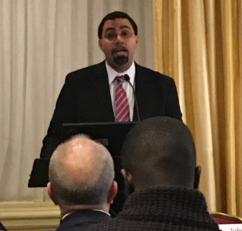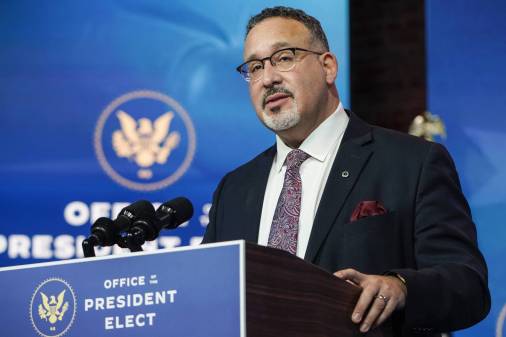For John King, personal struggles fuel passion for equity in education

Acting Education Secretary John King said Wednesday that states need to be “aggressive” when implementing the new Every Student Succeeds Act, which gives localities more oversight and responsibility over student performance and achievement.
King, who stepped into former Secretary Arne Duncan’s shoes this month, made his remarks at the U.S. Conference of Mayors at the Capital Hilton Hotel in Washington, D.C. He frequently invoked his personal struggles during childhood to show that states need to be mindful of equitable access to resources in all schools.
“I suspect I’m the first secretary of Education to be expelled from school,” he said. “But I believe in second chances.”
King grew up in Brooklyn, N.Y., and went to Public School 276 in Canarsie. His mother died when he was 8 years old, and he went to live with his father, who was ill and died when King was 12 years old.
Despite the many obstacles, he managed to land at Harvard, and then he received a law degree from Yale and a doctorate in education from Columbia.
“My life could have gone in a lot of directions. My teachers could have looked at me and said, ‘Here’s an African-American Latino male student going to New York City public school with a family in crisis – what chance does he have?'” he said to an audience of about two dozen mayors and other audience members. “But they didn’t. They invested in me, they had hope for me, and they saw promise in me.”
King said states’ most vulnerable children – children with disabilities, English language learners, dropouts, chronically absent kids and other students at risk – need to have a vision for their future.
The law requires that when students are struggling and schools are struggling, states have a responsibility to act and to intervene,” he said. “We need to make
sure that states are aggressive and leaning forward and trying to support schools
that are struggling the most. We cannot allow an intervention response to become just
a bureaucratic compliance exercise. It has to be meaningful.”
King mentioned the Investing in Innovation program, P-Tech high schools (which offer associate’s degrees in tech fields), and career and technical education programs as examples of alternative programs that can help disadvantaged children envision careers and futures.
“Many young men who got off track did not see a future for themselves, or weren’t clear on what their future looked like,” he said. “With career and technical education … I think for some students, particularly who dropped out, that can be a
very powerful lever, because you can see that immediate connection between what I’m doing in the classroom and what I might do afterwards.”
During a question-and-answer session, Tony Yarber, mayor of Jackson, Miss., wanted to know how to give every child the chance to innovate in school.
“My struggle is, how do we create an environment where the arts, innovation, technology and entrepreneurship are part of the norm, and not part of select or specialty schools in certain areas of our cities,” Yarber said.
King answered that under ESSA, struggling schools can qualify for more funding. But, he noted, “We need more investment.”
Reach Corinne Lestch at corinne.lestch@edscoop.com or follow her on Twitter @clestch and @edscoop_news. Reach Yizhu Wang at yizhu.wang@edscoop.com or follow her on Twitter @yizhuevy.




